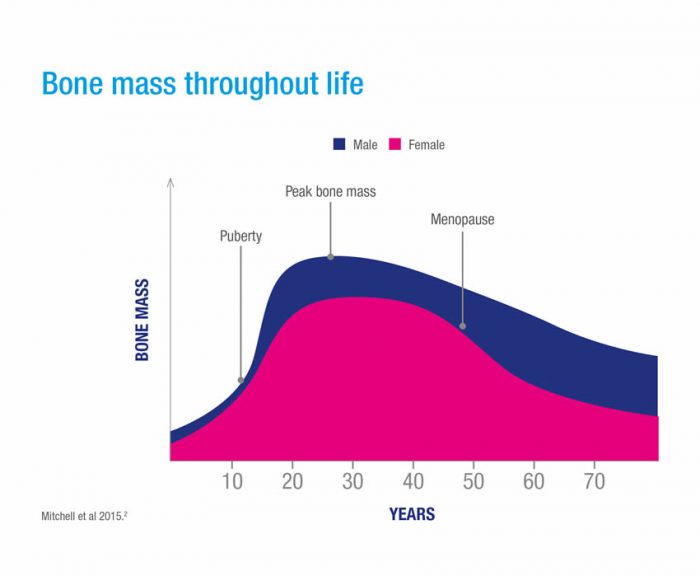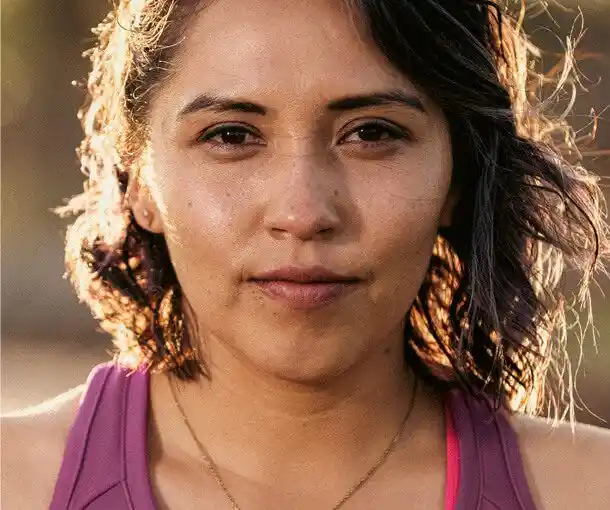Strong bones are essential for quality of life
Bones provide the structure for our bodies. They protect our internal organs, enable movement (working with our joints and muscles), act as a reservoir for calcium and produce blood cells (this occurs in the bone marrow).1
Our bones constantly change in size, shape and position throughout life. They are made up of bone cells which are responsible for continually removing old bone and replacing it with fresh bone. This is called bone remodelling which is an active process that relies on the correct balance between bone resorption (breaking down of bone) by osteoclast cells, and bone deposition (building of bone) by osteoblast cells.2
Bone remodelling
You can’t get bone mass back once it’s lost.
Our bones are living, growing tissues. So, no matter your age, making decisions that support long-term bone strength will always make a difference.
Making plans in your 30’s will help give you the strength you need for strong bones later in life. Consuming enough Vitamin D and Calcium in your 30’s is one way you can do this.

“YOU CAN’T GET BONE MASS BACK
ONCE IT’S LOST.”– DR. JENIFER TIDWELL
Improving bone strength at any age
There are some factors which can influence peak bone mass which we have no control over, such as genetics3.
There are, however, ways you can reduce the loss of bone mass as you get older. The diet and exercise in our 20’s and 30’s may help you maintain and improve your bone strength or maintain muscle mass, strength and functional capacity.
Some recommendations to build your bone strength in your 30’s include:
- Do regular weight-bearing and muscle strengthening exercises.
- Make sure your daily calcium intake is appropriate for your age (as per Australian Healthy Eating Guidelines)
- Maintain Vitamin D levels to normal levels to support optimal bone strength.
If you do this regularly, this will likely lead to improving your bone health. Stronger bones later in life will reduce the likelihood of broken and injured bones later in life5.
Using supplements to help maintain required nutrient levels
Calcium – fast facts:
- Bones store calcium and act like a calcium bank5
- Despite calcium is readily available in many different food sources in Australia, 73% of women don’t get enough calcium from their diet alone6
- The use of a supplement can be useful in maintaining adequate levels of calcium in the diet.6
Vitamin D – fast facts:
- The body needs vitamin D to absorb calcium from the diet so that it can be used as that readily available source in the bloodstream. In this way, Vitamin D is necessary to maintain/support bone strength7
- Because it is difficult to get Vitamin D from food alone (90% of Vitamin D is sourced from the sun’s UV rays) Vitamin D supplements are often recommended during different life stages
- Just under 1 in 4 (23%) Australian adults* don’t get enough vitamin D8.
Ostelin’s Bone Strength + range
Ostelin’s Bone Strength + range has been specifically designed to support adequate intake of Vitamin D to maintain bone strength and provide you with essential nutrients that are relevant for you today.
Disclaimer: This article is meant for information purposes only. Please consult your health professional if you have further concerns or questions related to your Calcium, vitamin D levels or risk factors.
References available on request
MAT-AU-2401875
Always read the label and follow the directions for use.
1 Better Health Channel. Bones. 2012 https://www.betterhealth.vic.gov.au/health/conditionsandtreatments/bones (accessed 04/09/2020)
2 Healthline. Osteoporosis Causes: Remodeling, Balance, and Hormones. 2019 https://www.healthline.com/health/osteoporosis-causes (accessed 04/09/2020) 3 NIH Kids and Their Bones: A Guide for Parents. 2018 https://www.bones.nih.gov/health-info/bone/bone-health/juvenile (accessed 04/09/2020) 4 NIH Osteoporosis. 2017 https://www.nia.nih.gov/health/osteoporosis (accessed 04/09/2020)
5 Better Health Channel, 2019, Calcium, Online, https://www.betterhealth.vic.gov.au/health/HealthyLiving/calcium (accessed 06/02/2020)
6 ABS Australian Health Survey: Nutrition First Results – Foods and Nutrients, 2011-12. https://www.abs.gov.au/ausstats/abs@.nsf/Lookup/by Subject/4364.0.55.008~2011-12~Main Features~Calcium~401 (accessed 24/08/20)
7 Higdon, J., (2017). Vitamin D. Linus Pauling Institute. Accessed 15/11/2019 from: https://lpi.oregonstate.edu/mic/vitamins/vitamin-D (accessed 04/09/2020)
8 ABS,Australian Health Survey: Usual Nutrient Intakes. 2011 12, cat. no. 4364.0.55.006
9 ABS, magnesium- 4364.0.55.008 – Australian Health Survey: Usual Nutrient Intakes
10 Bello A, Oesser S (2006) Collagen hydrolysate for the treatment of osteoarthritis and other joint disorders: a review of the literature, Current Medical Research and Opinion, 22:11, 2221-2232, DOI: https://www.tandfonline.com/doi/abs/10.1185/030079906X148373
Disclaimer: This article is meant for information purposes only. Please consult your health professional if you have further concerns or questions related to your Calcium, vitamin D levels or risk factors.






